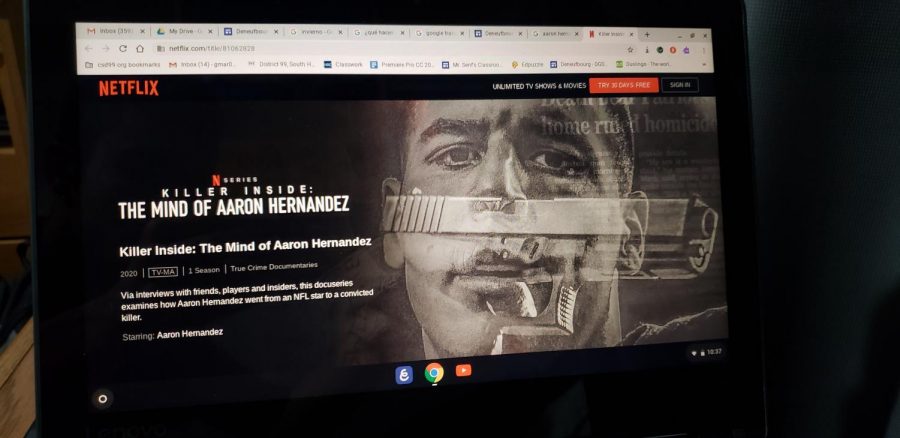Netflix’s ‘Killer Inside’ delves into the complexities of being a professional athlete
Aaron Hernandez was one of the youngest tight-ends to ever play in the NFL.
When Netflix released its intense trailer for the documentary series Killer Inside: The Mind of Aaron Hernandez, much anticipation was geared toward piecing together events that led Hernandez to murder his brother-in-law Odin Llyod. Along with Hernandez having been a revered tight-end for the New England Patriots, he had allegedly been involved in a drive-by shooting that claimed the lives of two club-goers. The documentary reveals that Hernandez’s downward spiral did not start at the peak of his career but rather at the beginning.
The first episode kicks off by showing Hernandez’s news footage after he was revealed to be the prime suspect in the murder of Odin Llyod. Within the few first minutes of the episode, it seemed that this documentary does not portray Hernandez to be a typical serial killer.
With CTE (Chronic Traumatic Encephalopathy) being discovered in the past decade, it has put the NFL under major scrutiny for how it has handled brain injuries among players. It also could have been one of the many factors that drove Hernandez to a terrible mental state.
Within the first episode, the documentary concentrates on Hernandez’s father Dennis, who was a coveted football player in his hometown. It was revealed that he was the primary influence for kick-starting his football career. Dennis’s alleged alcohol and drug misuse, as well as toxic masculinity, were among the many contributing factors in what shaped Hernandez’s personality.
Hernandez enjoyed a rather successful athletic life. In high school he played basketball, track and field, and football with older age groups. All the film and pictures in the documentary revealed Aaron had a picture-perfect life as a respected student-athlete. However, the documentary highlights the many hidden problems faced by Hernandez, including his sexuality.
The documentary added the twist of including an interview with Ryan O’Callaghan, a former NFL offensive tackle who is openly gay. In the second episode, he mentioned how “gay men drink martinis” and are expected to be “neat and fit,” (21:13). O’Callaghan ultimately used the football personality to help him fit in with stereotypical heterosexual men, and this all revealed the stigma around one’s sexuality in playing contact sports.
After the death of Dennis, Hernandez appeared to remain the picture-perfect player whom he sought to be. After having committed to the University of Florida before even graduating from high school, it still shed light on the physical dominance that Hernandez had obtained.
It’s as if the mental state of Hernandez playing through a multitude of head injuries, alleged physical and mental abuse was never put up for question. Starting from his tenure of playing pee-wee football, through high school, college and ultimately the NFL.
As Hernandez continued to shine on the field and eventually won the college National Championship, his regular life had begun to take a turn for the worse. Hernandez began to attend bars and strip-clubs and getting into confrontations with the owners all while being underage came as a surprise among all viewers.
The documentary continued to show Hernandez’s successes on the field. The one that hit most viewers the most was when he scored a touchdown in the Super Bowl 46, at the age of twenty-two. Hernandez consistently excelling on the field revealed how no one would ever pay attention to the mental storm that engulfed him on the inside. The pressures of winning, impressing your coaches to get more playing time are always in the mind of a division one athlete.
Even though the documentary veers into a load of factors that drove Hernandez to the edge, nothing else was more shocking than the autopsy of his brain. When doctors revealed the scans of Hernandez to that of a regular twenty-seven year old, I didn’t have to be an expert to see how he clearly had sustained life-long brain damage from the brain scans.
Overall, the documentary seemed a bit unorganized as it jumped around from factor to factor throughout the life of Hernandez. In his athletic life though, Aaron Hernandez was one of few who battled through injuries and mental pain to always shine on the field. All the while being one the youngest athletes in sports history to do it.
Any viewer can speculate as to why Hernandez murdered a future family and allegedly two others. In my view, it’s a blend of the pressures of being a perfect athlete every game, and taking care of yourself mentally.


